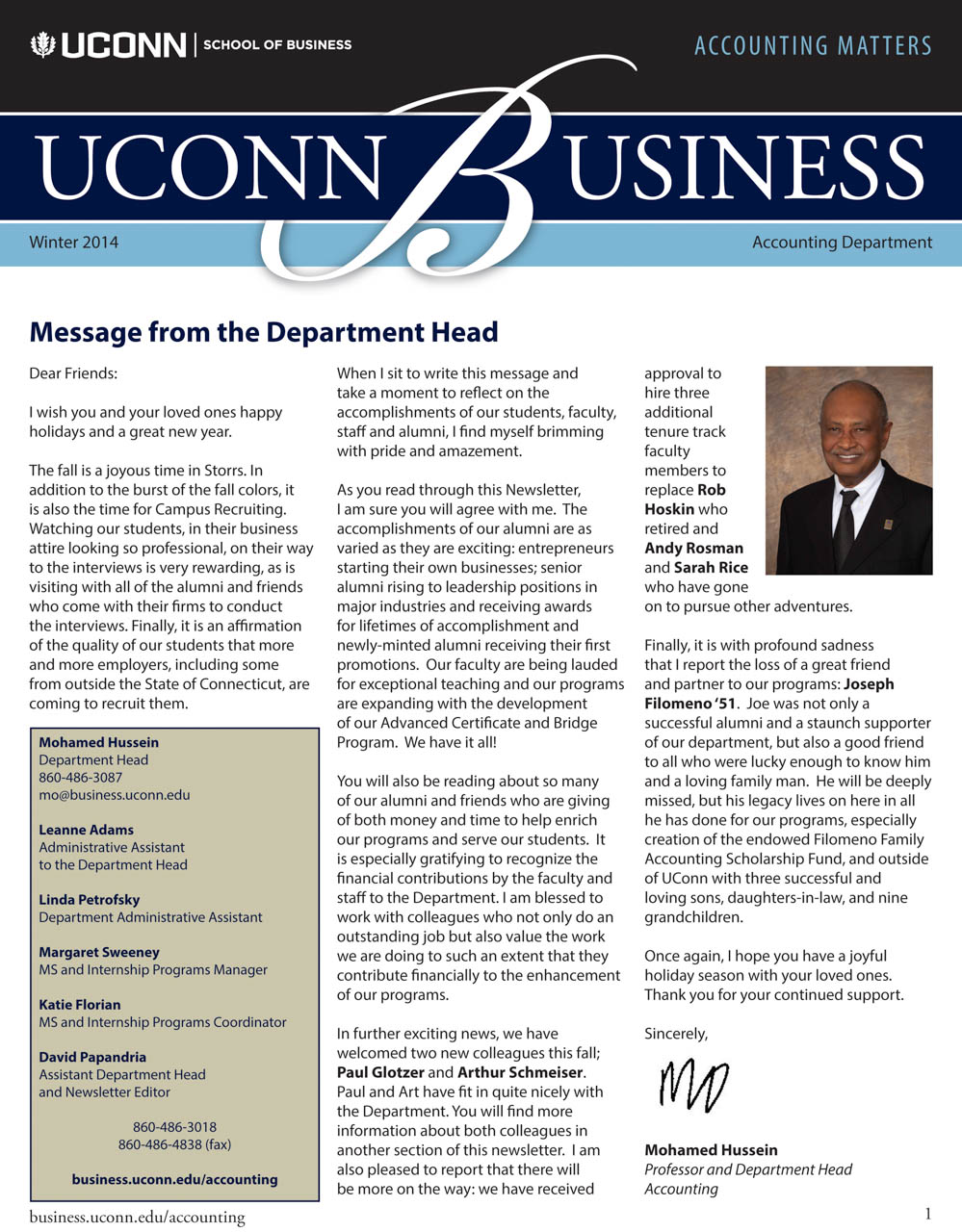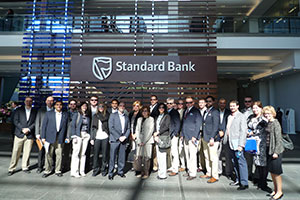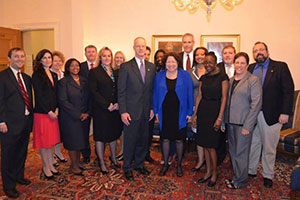The UConn School of Business is proud to announce a premier group of financial institutions supporting the School’s new undergraduate Financial Management major in Stamford.
The Financial Management major was designed and developed, in part, by CFA charterholders from prominent local hedge funds and investment firms. The major has been accepted into the CFA Institute’s University Recognition Program and stands to serve as inspiration to a program intent on helping cultivate a young generation of future CFA charterholders. The CFA credential has become one of the most globally respected designations and the Financial Management major, along with those selected within this program to join the Investment Management Program (IMP), will be exposed to academic and practical applications in finance coupled with reinforcement of strong ethical behavior.
“Through a progressive relationship with the CFA Society of Stamford, students who excel in the Financial Management major will be invited to join an exclusive Investment Management Program (IMP), which, among other benefits, provides access to a wide array of tools and research from financial institutions like Barclays, CreditSights, and Atlantic Asset Management,” said Jud Saviskas, executive director for the UConn School of Business in Stamford. “This innovative relationship encourages and facilitates an exchange of ideas, networking opportunities and career development for aspiring investment professionals – and it’s already received outside interest from many other colleges and universities.”
Last year, a group of IMP students travelled to Wall Street for a visit to several institutions such as Barclays, Bloomberg, and CreditSights. As program supporters, these companies allow students and faculty complimentary access to their client web portals such as, Barclays Live, which provides a range of research and financial analytics tools, and CreditSights’ online global research platform and an analytical staff of almost 80 investment professionals.
“Barclay’s and CreditSights’ web portals are an excellent tool for IMP students as they undertake the challenges of the program and the pursuit of the CFA Level I exam,” said Michael Dineen, senior vice president of Atlantic Asset Management and UConn adjunct professor.
Thomas Walsh, managing director at Barclays added that the collaboration with IMP is just one example of the importance the bank places on developing an early foundation of ethical investment knowledge. “The most successful students will be those who develop the skill sets they need to be productive and innovative members of the next generation’s workforce,” Walsh said. “We are delighted to be able to make Barclays Live available to IMP students and hope that they will derive significant benefit from these new resources.”
“We have had the pleasure to meet a number of IMP students, and they are coming into the space during interesting times in the evolution of the credit markets,” said Glenn Reynolds, CEO of CreditSights. “We hope the background information from prior credit cycles and our analysis of the structural shifts taking place today – most notably in banking and finance – can be of value as they prepare themselves for the role they can play in the markets. Credit has grown dramatically in all areas of the global economy from sovereign to corporate to household, and there are a lot of moving parts to the puzzle.”
Barclays
Barclays is a major global financial services provider engaged in personal banking, credit cards, corporate and investment banking and wealth and investment management, with an extensive international presence in Europe, the Americas, Africa and Asia. Barclays has long been recognized as a leader in not only fundamental equity and credit research but also technical and quantitative analysis. Their research, analytics and market-leading benchmark and tradable strategy indices are widely used by clients and the markets.
CreditSights
Founded by a group of analysts in September 2000, CreditSights is an independent research firm offering a range of fundamental research products, quantitative risk models, and ratings services that are used by clients making investment and risk management decisions. CreditSights does not underwrite securities or manage assets and has grown from 8 employees in 2000 to over 115 currently. The company has its main operations in New York, London, and Singapore.
Atlantic Asset Management
Atlantic Asset Management has been an independent registered investment advisor for over 20 years, focusing on institutional fixed-income and asset allocation strategies; and for 15 years, has run an investment manager “sponsorship” program, where promising emerging managers focusing on niche market segments have received seeding and infrastructure support to help grow their businesses.


